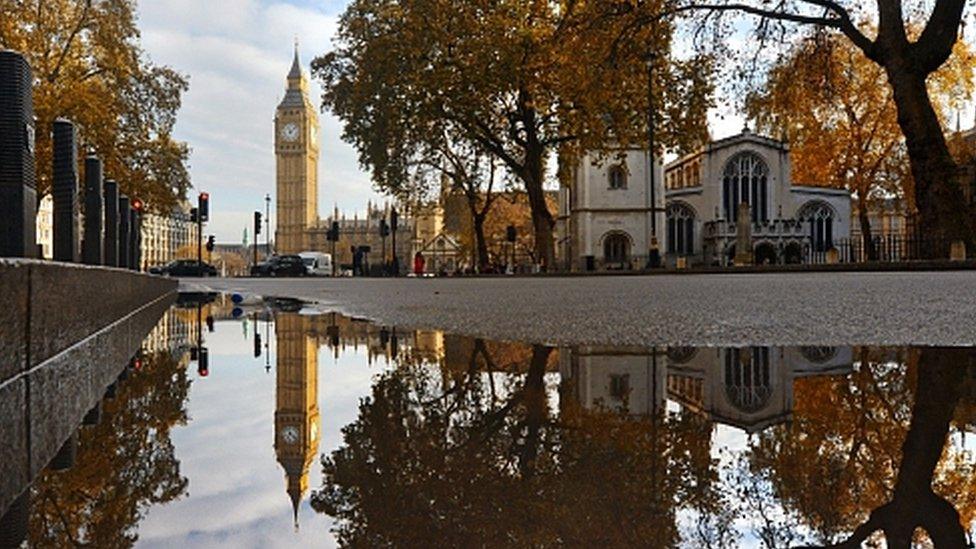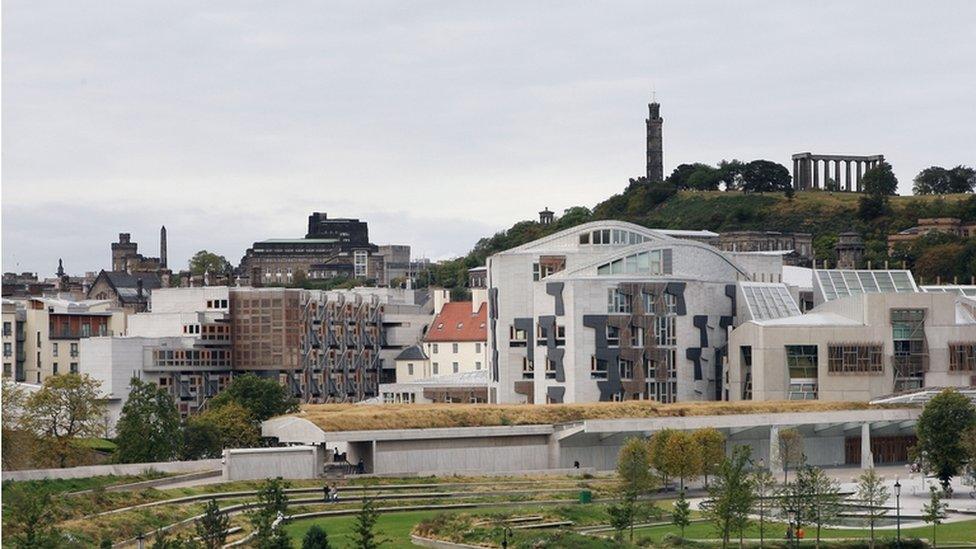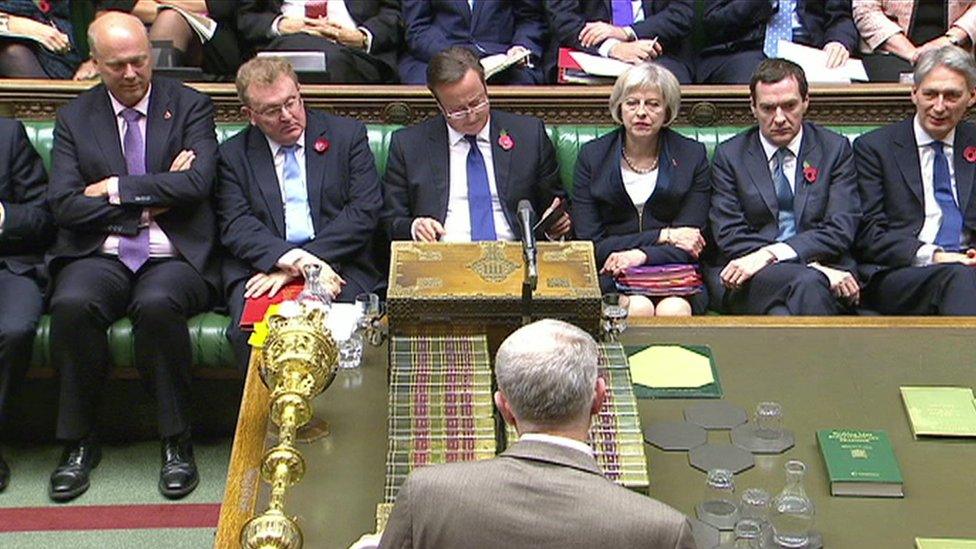The week ahead
- Published

Westminster breaks for a short autumn recess
It's a short Parliamentary week, but MPs have some contentious legislating to get through before they can enjoy a long November weekend.
Detailed debate on both the Scotland Bill (Monday) and the Trade Union Bill (Tuesday) look likely to provoke some bare-knuckle politics in the Chamber.
Monday 9th November
The Commons opens for business at 14.30 ( GMT) with genial Communities and Local Government Secretary, Greg Clark providing the warm-up. But the key to the rest of the day's action will be whether or not time is then absorbed by ministerial statements or urgent questions.
MPs are due to spend the bulk of their afternoon on the report stage of the Scotland Bill, where there are a shedload of amendments from all quarters. One government amendment makes the Scottish Parliament and government "permanent parts of the United Kingdom's constitutional arrangements" which cannot be abolished except by a decision of the people of Scotland in a referendum. Another provides competence to legislate for social security benefits, if paid for by the Scottish Government.
Labour's shadow Scottish secretary, Ian Murray, calls for an independent commission on full fiscal autonomy, to provide an authoritative analysis of the implications of devolving full tax and spend powers to Holyrood. It would be required to report by next March and there's a similar amendment calling for a committee to oversee the transition and implementation of welfare powers.
He also has an amendment to allow the VAT take from Scotland to be, in effect, paid to the Scottish government. Uber-localist, Labour's Graham Allen wants to give extra tax-raising powers to Scottish councils and a power of general competence which would allow them greater freedom of action (he attaches amendments on this sort of thing to every possible bill).
The Liberal Democrat former Scottish Secretary, Alistair Carmichael wants to remove the word "normally" from this clause: "But it is recognised that the Parliament of the United Kingdom will not normally legislate with regard to devolved matters without the consent of the Scottish Parliament." And add a ban on any alteration to the powers of the Parliament itself.
But the real kickers are the SNP's amendments.
There's one to ensure that the UK Parliament can only legislate in devolved areas with the consent of the Scottish Parliament, putting the Sewel Convention onto a statutory footing. Another would enable the Scottish Parliament to amend the Scotland Act 1998 to remove the reservation on taxation, borrowing and public expenditure in Scotland, with the effect that the Scottish Parliament could move to full fiscal autonomy. They also call for power over child tax credit, and working tax credit to be transferred to Holyrood and yet another amendment would permit the Scottish Parliament to decide whether and when to hold another independence referendum.
How much of this will get debated is an interesting question, the programme motion sets aside six hours for debate, but there are some very big issues here, and some will certainly not get discussed on the floor of the House. It's a far cry from Sir George Young's tenure as Leader of the Commons, when report stage discussion frequently stretched over a couple of days and it does open the door for peers to tinker with matters that MPs didn't get around to talking about. This could end up providing a textbook example of why the apparently boring details of scheduling in the Commons can matter rather a lot.

MPs will debate proposals to give more powers to the Scottish Parliament.
The day ends with an adjournment debate on human rights in Eritrea led by Labour's Matthew Pennycook. He says: "Cruelty, tyranny, and forced conscription and labour are everyday experiences for Eritreans under the hermetic regime of President Isaias Afwerki. The oppressive nature of the regime is why 5,000 Eritreans embark each month on a treacherous exodus from their Horn of Africa homeland. "
In the Lords (14:30 GMT) proceedings open with the arrival of two Tory ex-ministers Viscount Hailsham of Kettlethorpe (ex-Agriculture Minister Douglas Hogg) and Lord Robathan (early Cameron backer and defence minister Andrew Robathan).
The day's questions cover; updating legislation on dog breeding and boarding, incursions by Spanish vessels and aircraft into UK waters and airspace, the number of refugees in the UK under the vulnerable persons relocation scheme and the cost of operations and procedures undertaken in hospitals and by GPs.
The day's legislating is on the detail of the Bank of England and Financial Services Bill which covers the Bank of England's governance and financial arrangements. And there will also be a short debate on the tabling of Parliamentary questions led by Labour's Lord Hunt of Chesterton.
Tuesday November 10th
The Commons begins, (11.30 GMT) with business, innovation and skills questions and then Labour MP Ian Austin has a ten minute rule bill to decentralise government departments and move much of their operations away from London.
Then the real action starts with the report stage of the Trade Union Bill. Here, all sorts of issues are in play and there's a bit of competition to champion union rights between Labour and the SNP.
Labour have a series of amendments down on the conduct of strike ballots, including allowing online voting. And watch out for the issue of banning employers from deducting union subscriptions from pay packets, a number of Conservative MPs think the Government has no business interfering in voluntary arrangements between unions and employers.
The SNP have an amendment to ban employers from hiring agency workers to replace strikers, and another to make the obligation of picket organisers to show their union letter taking responsibility for a picket to the police, only if the police officer concerned, in turn identifies themselves by name and station.
The adjournment debate, led by the Conservative Oliver Colvile, is on hedgehog conservation.
In Westminster Hall, Jess Phillips' debate on the family-friendliness of the Houses of Parliament (14.30 - 16:00 GMT) caught my eye. And, after that there's an interesting looking excursion into the role of devolved administrations in UK renegotiation of EU membership led by the SNP's Stephen Gethins.
In the Lords (14.30 GMT) there are two more new arrivals, Lord Barker of Battle (former Conservative energy minister Greg Barker) and Baroness (Lorely) Burt of Solihull a former Lib Dem MP.
Questions to ministers cover; the spread of Japanese knotweed, the basic farm payment to be paid to qualifying farmers and the policy review of resettlement in the Chagos Islands.
Then peers move to a House motion to set up a Lords foreign affairs committee, which may lead to a brief debate. The day's legislation is on the second readings of the National Insurance Contributions (Rate Ceilings) Bill and then all stages of the Finance Bill. This enacts measures from the June Budget, but given the Lords don't interfere in money bills it will morph into a general economic debate, expect lots of laboured emphasis on their Lordships' respect for the convention that they leave money bills alone, given the tax credits vote a couple of weeks ago.
Wednesday November 11th
It's a Lords-only day in Westminster and peers begin at 11:00 ( GMT) with questions to ministers. The subjects include the tourism benefits to the UK of hosting the Rugby World Cup.
Then they move onto the second day of detailed scrutiny of the Bank of England and Financial Services Bill, which covers Bank of England prudential regulations, and financial services. In the lunch break there will be a short debate on bilateral trade between the UK and African countries.
After that, peers follow MPs off onto their half-term break both Houses return on Monday November 16th. I'll preview their scheduled adventures then , next week.
- Published4 November 2015
